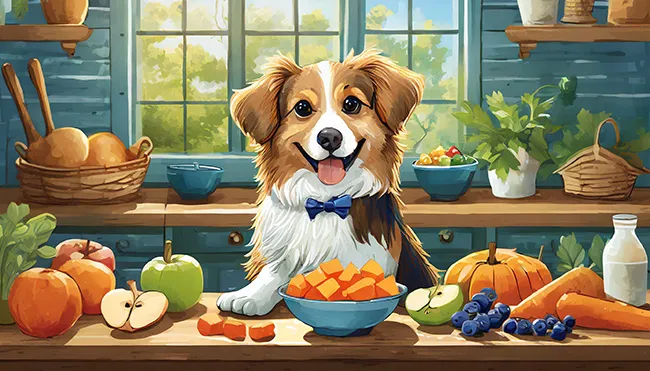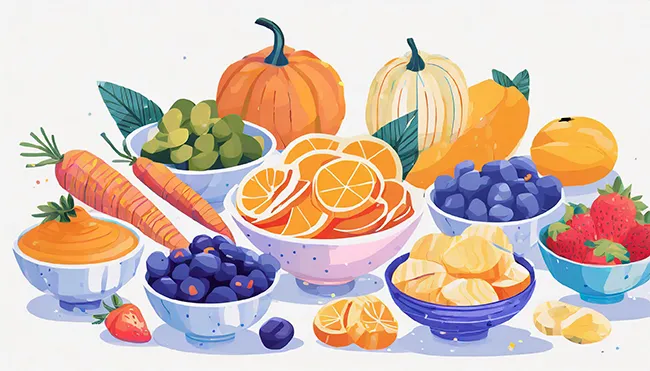
Dive into the world of dog nutrition with an electrifying twist! “Unlock the Secrets to Safe Human Foods for Dogs” is more than just a guide; it’s your golden ticket to revolutionizing your furry friend’s diet. Imagine the joy and vibrancy you can add to your dog’s mealtime by incorporating human foods that are not only safe but also high in health benefits. This captivating journey reveals the ultimate list of dog-friendly human foods, changing the way you think about feeding your pet.
Accept the power of nutrition as we walk you through a carefully curated selection of foods designed to boost your dog’s health, vitality, and happiness. Prepare to open up a world of flavor, nourishment, and excitement for your beloved canine companion, all while ensuring their diet is balanced, safe, and absolutely thrilling!
Safe Human Foods for Canine Consumption

Before diving into the specifics of dog-friendly diets, it’s essential to understand that not all human foods are suitable for canine consumption. However, many fruits, vegetables, proteins, grains, and even certain dairy products can safely be part of your dog’s diet when chosen and prepared correctly. These foods can offer a range of nutritional benefits, from essential vitamins and minerals to fiber and omega-3 fatty acids, contributing to your pet’s overall health, energy levels, and digestive wellbeing.
Fruits and Vegetables That Are Dog-Friendly

As we look into nature’s bounty, we find that many fruits and veggies are not only tasty for people but also good for our dogs. These dog-friendly options are not just for variety’s sake; they also add vitamins, minerals, and fiber to your pet’s diet, which is good for their general health and digestive health.
Here is a complete list of fruits and veggies that dogs can eat and that are good for them:
Fruits
- Apples (without seeds)
- Bananas
- Blueberries
- Cantaloupe
- Cranberries
- Mango (without the pit)
- Oranges (in small amounts)
- Peaches (without the pit)
- Pears (without the core and seeds)
- Pineapple
- Raspberries
- Strawberries
- Watermelon (without seeds and rind)
Vegetables
- Carrots
- Green Beans
- Peas (including snow peas and snap peas)
- Broccoli (in very small amounts due to its potential to cause gas)
- Brussels Sprouts (also in small quantities for the same reason as broccoli)
- Cucumbers
- Pumpkin (plain, without any added sugars or spices)
- Sweet Potatoes
- Spinach (in small quantities due to high oxalic acid content)
- Zucchini
When offering these fruits and vegetables to your dog, it’s essential to remove any seeds, pits, and inedible skins that could pose a choking hazard or contain harmful substances. By introducing these healthy snacks into your dog’s diet, you’re not just spicing up their mealtime—you’re contributing to a lifestyle of wellness and vitality.
Proteins: Safe Meat and Fish Options for Dogs

Protein is a cornerstone of a healthy canine diet, fueling muscle development and overall vitality. When it comes to pampering our pooches with protein-rich foods, the selection of safe meats and fish is paramount. Lean meats such as chicken, turkey, and beef, along with fish like salmon and sardines, emerge as stellar choices. These protein powerhouses are not only packed with essential amino acids but also brimming with omega-3 fatty acids, known for their beneficial effects on a dog’s skin and coat health. However, the golden rule is to serve these proteins cooked and without any bones to avoid any potential health hazards. Moreover, eschewing seasonings and spices ensures that these meats and fish are ideally suited for canine consumption. Let’s dive into a comprehensive list of protein sources that are both safe and nutritious for dogs:
Safe Meat Options for Dogs
- Chicken: A lean, easily digestible protein source that’s also budget-friendly.
- Turkey: Another lean meat that’s often recommended for dogs with sensitivities.
- Beef: Offers a rich source of protein and essential vitamins and minerals.
- Pork: While safe in moderation, it should be cooked thoroughly and offered infrequently due to its higher fat content compared to other meats.
- Lamb: An excellent alternative protein source for dogs that may be allergic to more common meats.
Safe Fish Options for Dogs
- Salmon: A fantastic source of omega-3 fatty acids, which promote healthy skin and coat. Always cook salmon thoroughly to kill any parasites.
- Sardines: Small and typically safe from heavy metals, sardines are packed with omega-3s and are usually served whole.
- Cod: A lean fish that’s low in fat and high in protein.
- Tilapia: Another mild, lean fish that can be a good protein source for dogs.
Preparation and Serving Tips
- Always remove bones from fish and meat to prevent choking or internal injuries.
- Cook all protein sources thoroughly without any added fats, oils, or seasonings to avoid digestive issues or toxicities.
- Introduce new proteins gradually into your dog’s diet to monitor for any adverse reactions or allergies.
Incorporating these safe and nutritious proteins into your dog’s diet enhances their mealtime with diversity and essential nutrients, contributing to a happy, healthy life companion. By selecting the right types of meat and fish and preparing them safely, you ensure your dog benefits from the myriad of health advantages these protein sources offer.
Grains and Cereals: What Can Dogs Safely Eat?
Grains and cereals can play a supportive role in a dog’s diet, offering essential energy and fiber that aid in digestion. When chosen wisely and prepared correctly, whole grains such as rice, barley, and oatmeal can be both safe and beneficial for our canine friends. These grains are particularly advantageous for dogs with sensitive stomachs, providing a gentle source of nutrition without the unnecessary additives of salt or sugar. It’s important to integrate these grains in moderation and as part of a balanced diet. Here’s a closer look at which grains and cereals dogs can safely enjoy:
Safe Grains and Cereals for Dogs
- Rice: Easily digestible and often recommended for dogs with gastrointestinal upset. Both white and brown rice are good options, with brown rice offering more fiber.
- Barley: A nutritious, hearty grain that provides fiber, vitamins, and minerals.
- Oatmeal: Rich in soluble fiber, oatmeal is great for dogs with bowel irregularity issues. Ensure it’s cooked and served plain.
- Quinoa: Often considered a superfood, quinoa is high in protein and a good alternative for wheat, corn, and soy—grains that some dogs are allergic to.
- Wheat: Safe for dogs without a wheat allergy, it’s a common ingredient in many dog foods. Whole wheat is preferable for its higher nutritional content.
Preparation and Serving Tips
- Cook grains thoroughly to ensure they’re easy for dogs to digest and to increase nutrient availability.
- Avoid adding salt, sugar, or spices that could harm your dog or cause digestive issues.
- Introduce new grains gradually into your dog’s diet to assess their tolerance and prevent any adverse reactions.
While grains are not a necessity for every dog’s diet, they can be a valuable source of additional nutrients for some. Offering these safe grains and cereals can contribute to a varied and balanced diet, ensuring your dog remains healthy, happy, and full of energy.
Dairy and Dairy Alternatives: A Guide for Dog Owners
Navigating the dairy aisle for your dog comes with its set of guidelines and precautions. While some dairy products like plain yogurt or cottage cheese can be beneficial in small doses, offering a good source of calcium and protein, it’s crucial to remember that many dogs are lactose intolerant. This intolerance means that while a little dairy can be a treat, too much can lead to digestive distress. Starting with minimal amounts is key to gauging your dog’s reaction and ensuring their comfort and health. Here’s a concise guide to dairy and dairy alternatives safe for canine consumption:
Safe Dairy and Dairy Alternatives for Dogs
- Plain Yogurt: Offers probiotics and is lower in lactose, making it easier for dogs to digest. Ensure it’s unsweetened and without artificial sweeteners, especially xylitol, which is toxic to dogs.
- Cottage Cheese: Another low-lactose dairy option that can be a good protein source. Its soft texture also makes it easy for dogs to eat.
- Cheeses: Hard cheeses like cheddar are lower in lactose and can be given in very small quantities. Always opt for low-fat options and avoid spicy varieties or those with added herbs.
Precautions for Dairy Consumption
- Monitor for Digestive Upset: Watch for signs of lactose intolerance in your dog, such as diarrhea, vomiting, or gas, after consuming dairy products.
- Moderation is Key: Dairy should only be a small part of your dog’s diet, primarily used as an occasional treat rather than a staple.
- Avoid Sugary and Artificial Sweeteners: Many dairy products marketed for humans contain additives that can be harmful to dogs. Always choose plain, unsweetened varieties.
Dairy Alternatives
While traditional dairy products have their place, some dairy alternatives might also be safe for dogs, with caution:
- Unsweetened Almond Milk: In very small quantities, as some dogs may find this easier to digest than cow’s milk. However, ensure it’s free from sweeteners and additives.
- Coconut Milk: Also in moderation, as it’s high in calories and fat. Choose the unsweetened, unflavored variety.
Dairy and its alternatives can add variety and extra nutrients to your dog’s diet when used correctly. Starting with tiny amounts and closely monitoring your dog’s reaction will ensure that this addition to their diet is both safe and enjoyable. Always prioritize products that are plain and low in lactose to cater to your dog’s digestive system, making dairy a delightful treat rather than a dietary staple.
Benefits of Including Human Foods in Your Dog’s Diet
Incorporating human foods into your dog’s diet transcends mere culinary indulgence; it’s a strategic move towards optimizing their health and happiness. This practice, when done judiciously, has manifold benefits that can significantly enhance the well-being of our canine companions.
Nutritional Advantages of Supplementing Dog Food with Human Foods
Diverse Nutrient Profile: Commercial dog foods, despite their convenience and balanced formulation, may not always provide the full spectrum of nutrients that dogs can benefit from. Integrating human foods, particularly those rich in vitamins, minerals, and antioxidants, can bridge this gap. For instance, the antioxidants in blueberries or the beta-carotene in carrots can bolster the immune system, while the fiber in apples supports digestive health.
Bioavailability: The nutrients in fresh, whole foods are often more bioavailable than those in processed dog foods. This means that the nutrients are in a form that the dog’s body can absorb and utilize more efficiently, leading to better health outcomes.
Enhancing Meal Variety and Taste for Your Dog
Sensory Stimulation: Dogs, much like humans, have taste preferences and enjoy a change in their diet. Introducing a variety of human foods can stimulate their senses and make mealtime more engaging. The novelty of new flavors and textures can be particularly beneficial for picky eaters, encouraging them to eat well and maintain a healthy appetite.
Emotional Bonding: Sharing safe human foods with your dog can also strengthen the emotional bond between pet and owner. This shared experience not only brings joy to mealtime but also reinforces the dog’s trust and affection towards their human family.
The Role of Human Foods in Managing Weight and Health Conditions
Targeted Dietary Support: Certain human foods can be strategically used to manage specific health conditions or dietary needs under a veterinarian’s guidance. For example, pumpkin is often recommended for its fiber content, which can aid in digestion and help manage diarrhea or constipation. Similarly, lean proteins such as chicken or turkey can support weight management by providing essential nutrients without excess calories.
Supplemental Health Benefits: Beyond addressing specific conditions, the inclusion of human foods in a dog’s diet can support overall health maintenance. Omega-3 fatty acids from fish, for instance, can improve coat health and reduce inflammation, while the probiotics in plain, unsweetened yogurt can support gut health.
How to Safely Introduce Human Foods into Your Dog’s Diet
Portion Control and Frequency: Key Considerations
When introducing human foods to your dog’s diet, start with small portions and observe how they react. It’s important to maintain a balance between commercial dog food and human food to ensure your dog gets all the necessary nutrients.
Identifying and Managing Food Allergies and Sensitivities
Some dogs may have allergies or sensitivities to certain foods. If you notice any adverse reactions like itching, gastrointestinal upset, or lethargy after introducing a new food, consult your veterinarian.
Human Foods to Avoid: Protecting Your Dog from Harmful Substances
Common Toxic Foods for Dogs
Certain human foods are toxic to dogs and should always be avoided. These include chocolate, grapes and raisins, onions and garlic, xylitol (a common sweetener in sugar-free products), and alcohol.
Understanding the Signs of Food Toxicity in Dogs
Signs of food toxicity can range from vomiting and diarrhea to more severe symptoms like seizures and difficulty breathing. If you suspect your dog has ingested a toxic substance, seek veterinary care immediately.
Consulting with Veterinarians: Tailoring Your Dog’s Diet for Optimal Health
Before making significant changes to your dog’s diet, it’s wise to consult with a veterinarian. They can provide personalized advice based on your dog’s specific nutritional needs, age, breed, and health conditions.
Customizing Your Dog’s Diet Based on Age, Breed, and Health Conditions
A diet that’s beneficial for a young, active dog may not be suitable for an older dog with less mobility. Veterinarians can help tailor your dog’s diet to their specific life stage and health needs, ensuring they get the right balance of nutrients.
DIY Dog Treats: Incorporating Safe Human Foods
Creating homemade dog treats using safe human foods can be a fun way to spoil your pet while ensuring they’re eating healthily. Simple recipes can include frozen yogurt treats, baked sweet potato slices, or homemade meatballs with lean meats and vegetables.
Conclusion
Incorporating human foods into your dog’s diet can enrich their nutritional intake and bring joy to mealtime. However, it’s crucial to do so with safety and moderation in mind, ensuring that the foods you share are safe and beneficial for your furry friend. By consulting with professionals and paying close attention to your dog’s health and preferences, you can create a diet that supports their well-being and strengthens the bond you share.



